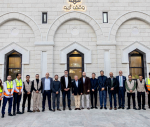You are here
Extremists foiling governments with encryption — UN experts
By AP - Aug 18,2016 - Last updated at Aug 18,2016
UNITED NATIONS — Increasing numbers of foreign fighters for the Daesh terror group and Al Qaeda are returning home, potentially to carry out attacks, and are using the “dark web” or encrypted messaging that the most sophisticated intelligence agencies cannot penetrate, UN experts said in a report circulated Wednesday.
The experts monitoring sanctions against the extremist groups said governments highlighted the challenge to national security from the communication methods being used by these “foreign terrorist fighters” and people being radicalised at home who need to be monitored and investigated.
They said the rise in the use of the “dark web” — a collection of thousands of websites which use tools to maintain anonymity — and especially encrypted messaging “has closed off the ability of even the most sophisticated agencies to penetrate huge quantities of messages”.
The result, the experts said, is that governments are “potentially losing much of their previous technological advantage over terror groups”.
Recruiters for the Daesh group, once they engage potential militants, also swiftly move them to “closed forums” and guide them towards encrypted messaging systems, the experts said.
The expert panel’s report to the Security Council said the threat from Al Qaeda, Daesh, and their associates “is serious and diversifying”, despite military setbacks for Daesh fighters in Iraq, Syria Afghanistan and Libya.
Daesh ”demonstrated its ability to conduct complex, multistage attacks outside the conflict zone” while at the same time the role of its affiliates in the wider region was elevated, the panel said.
The near-simultaneous attacks conducted by Daesh operatives in Paris in November 2015 and Brussels in March generated an overwhelming flow of information to command centres which governments described as a deliberate tactic by the extremist group “to make it more difficult to mount coordinated and targeted responses to the most dangerous continuing threats”, the experts said.
Al Qaeda and its affiliates also maintained their position in various regions “and also demonstrated an ability to successfully plan and execute significant attacks”, the panel said.
The experts said governments estimate that Daesh has up to 30,000 fighters in Syria and Iraq.
Significant numbers of Daesh militants have been killed as a result of military attacks and the rate of fighters leaving the extremist group has increased, but the panel said governments report that this trend is partially offset by the continued flow of new militants into Syria and Iraq and by forced recruitment among tribes and the use of child soldiers since 2014.
The panel said Daesh’s financial situation has deteriorated since last July, with oil production declining by between 30 and 50 per cent as a result of air strike targeting oil infrastructure.
“Consequently oil revenue has fallen by tens of millions of dollars per month,” it said.
The group’s financial woes have also led to salary cuts for fighters, the panel said, but Daesh continues to earn significant revenue from taxation and extortion, the panel said.
According to governments, Daesh may earn as much as $30 million a month from these methods which include business taxes, fees for electricity and water, rent for seized real estate and customs duties and passage fees.
In a sign of desperation, the panel said that in February Daesh started to tax the most impoverished civilians in areas under its control who had previously been exempt.
Related Articles
UNITED NATIONS — A UN panel is calling for Internet and social media companies to respond to the exploitation of their services by Al Qaeda
PARIS — As the Daesh terror group sees city after city slip from its grasp, analysts warn of retaliatory terror attacks in the West and a po
UNITED NATIONS — The Daesh terror group is militarily on the defensive, facing a drop in revenue from oil and extortion and a shrinking abil

















